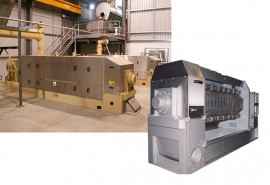

Physical & Chemical Refining

Oil Mills

Fat Modification

Oil seeds preparation
Solvent Extraction
The seed, having been properly prepared, is separated into a crude oil fraction and a protein meal fraction by solvent extraction. The extractor utilizes a countercurrent, multi-stage washing with commercial hexane solvent to enable a reasonable quantity of solvent to extract a maximum quantity of oil. After washing, the solventladen meal drains by gravity and then discharges to meal desolventising. After washing, the oil/solvent mixture, commonly referred to as “miscella”, discharges to distillation.
With technology collaboration with Belgium's Desmet Ballestra, we can handle single plant capacity – Up to 20,000 TPD and more than 40 varieties of seeds handled
Physical & Chemical Refining
Physical and chemical refinery for edible oil Full range of Feedstock’s – Ground nut, Soybean, Mustard, Sunflower, Rapeseed with conventional design and cold refining process. Losses are minimized through streamlines process control and heat recovery obtained more than 80% and utilities consumption minimized to reduce the operational cost
All crude oils and fats obtained after rendering, crushing or solvent extraction, inevitably contain variable amounts of non-glyceridic co-constituents like fatty acids, partial glycerides (mono- and diglycerides), phosphatides, sterols, tocopherols, hydrocarbons, pigments (gossypol, chlorophyll), vitamins (carotene), sterol glucosides, protein fragments as well as resinous and mucilagenous materials, traces of pesticides and "heavy" metals.
Oil Mills
Rosedowns is a pioneer in its field. Having an unrivalled reputation around the world for supplying processing equipment and replacement parts to the vegetable oil and rendering industries, Rosedowns boasts references of its equipment in more than 100 countries.
The first choice for screw presses
Rosedowns are at the forefront of pressing technology and, with more than 3,500 presses supplied worldwide, Rosedowns can claim to be the world’s leader in the design and manufacture of Screw Presses, continually setting new standards for design and performance.
With a range of presses having capacities from 40kg/hr to 900 Tonnes/day (dependent upon feed material), Rosedowns has a press to suit your processing needs.
In setting a high standard of quality and performance, Rosedowns Screw Presses are operated not only by all the multi-national, but independent processors too, each time proving to be a highly successful and reliable investment.
Fat Modification
In their native form, most edible oils have only limited application in food products. They are therefore often modified, chemically and/or physically, in order to alter their textural properties.
In the industry, 3 principal modification processes are used:
- Fractionation will separate the fat into a more solid and a more liquid fraction;
- Interesterification imposes a redistribution of the fatty acids over the triglyceride which allows to chemically ‘blend’ properties of different oil;
- Hydrogenation will saturate the double bonds in the fat, leading to a much harder fat.
Like all our edible oil processing technologies, Desmet Ballestra’s proprietary oil modification technologies are continuously reconceived and improved in order to deliver the highest product quality in combination with minimal operation costs and least of environmental load. Indeed, our most contemporary processes like enzymatic interesterification and speciality fats fractionation can boast a much ‘greener’ image because of their safer, more sustainable and efficient way of operation. Moreover, the ease of use on a daily basis and possibility to integrate various technologies within one processing plant opens the way to even better process control, as well as synergistic combinations between the different modification techniques.
Oil seeds preparation
The purpose of preparation is to modify the seed into a shape that is suitable for fast and effective extraction by mechanical pressing or by solvent extraction.
It is a succession of several of the following processes: seed Dehulling, to increase the protein content of the de-oiled meal, Cracking, to reduce the particle size of the seeds, Cooking, to reduce the viscosity of the oil and adjust the moisture content, Flaking, to rupture the cell structure of the broken seeds, and sometimes Expanding, to enhance extraction parameters.